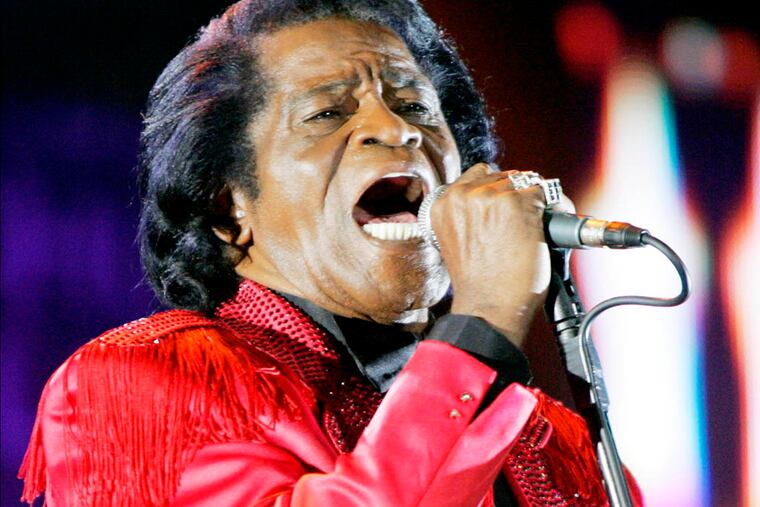Chadwick Boseman found the real James Brown on 'Mike Douglas'
"Get on Up" star talks about the personal issues that drove the hardest working man in show business.

IF CHADWICK BOSEMAN ends up winning an award for his uncanny embodiment of James Brown in "Get on Up," he might take time to thank Mike Douglas.
As he researched Brown, Boseman found ample concert footage of the singer, but Boseman wanted to see his subject in a more casual setting - Brown being Brown. He found a treasure trove of material while viewing clips of "The Mike Douglas Show," taped in Philadelphia from 1965 until 1978, an era in which Brown was a frequent contributor.
"Douglas always had a different guest host, and you see James Brown on there all the time, and I learned a lot from watching him," Boseman said. "I think you could say [the Douglas show] was the equivalent in some ways of the Bill Maher show: You had all these interesting people sort of thrown together.
"And there is James Brown, going toe-to-toe with some of the most powerful minds in the country, talking about issues like race and Vietnam and economics. It was just an interesting thing to find him in that space. He was an eloquent voice for black America. For all of America, really."
Boseman is a biopic specialist. In addition to Brown, he also played Jackie Robinson in "42," making him Hollywood's apparent go-to guy for African-American icons.
There are similarities - both men helped unify the culture with their talent ("Get on Up" is produced by Mick Jagger, in part as a way of acknowledging Brown's musical influence) - but they were fundamentally different people.
Family was sacred to the deeply religious Robinson, Boseman noted, whereas Brown had a difficult time maintaining relationships, even friendships.
For Boseman, getting inside Brown's head meant figuring out why Brown had such a hard time trusting people. He thinks the answer lies in Brown's tough childhood, in South Carolina.
"Both parents left him at a very young age," Boseman said. "He was abandoned completely, and raised in a brothel, where he obviously learned to see relationships between men and women in a very unhealthy way.
"I don't think being left by your parents is something you ever get over. I think he had extremely significant abandonment issues. That was probably the key source for me emotionally, tapping into the fear of abandonment."
Brown had many girlfriends and several wives (Jill Scott plays his first wife), and was arrested for domestic abuse.
In the movie, he has his most enduring personal relationship with sideman Bobby Byrd (Nelsan Ellis). It ends up forming the emotional center of the movie, which balances Brown's musical development with his struggle to let people get close.
"I think you see little pieces of his trust issues in almost everything that he does, his need to control his environment," Boseman said. Brown was famous for running a tight ship on the road, fining musicians and performers for minor infractions.
"What you see over and over is this idea of him not wanting people to leave, then pretending not to care if they do," Boseman said. "He was constantly testing people to see if they needed him."
At the same time, Boseman said, Brown's incredible drive to succeed came from his self-reliance. "I think for James it was really a two-edged sword. Part of what made him great was he was so independent, and he was independent because he had to be. He had to make it on his own."
And he surely did. He had few peers, Boseman notes, when it came to business smarts (in the movie, he ends up managing his own record-company manager, played by Dan Aykroyd). He was one of the first entertainers to understand the idea of branding, and of building businesses around the brand, just one aspect of Brown that's been copied by hip-hop entrepreneurs.
"It's interesting that James is one of the most sampled artists of all time," Boseman said. "He's one of the first people to rap over a beat, and he's also one of the first moguls. He encompasses many aspects of the hip-hop aesthetic. The dancers, the music, the vocals, the DJ, as well as the business itself. One thing you see in the movie is that he invented the street team, the grass-roots advertising that basically fueled hip-hop for years."
He also brought up the rhythm in R&B - there's a great scene in "Get on Up" of an exasperated Brown explaining to band members that every instrument in the band is a drum - a means of delivering the beat.
Boseman, though, thinks Brown was an underrated crooner, band or no band (one of the first things you find on YouTube is a clip of Brown and Douglas singing an a capella duet of "You're Nobody 'Til Somebody Loves You").
"I get floored when I listen to him sing a ballad. There's nothing he couldn't do."
More James Brown: Check out this video of an appearance on "The Mike Douglas Show."